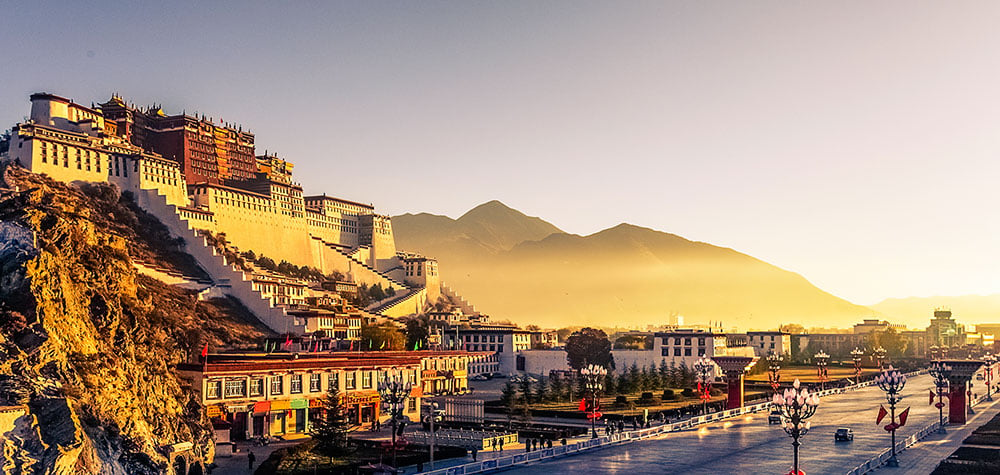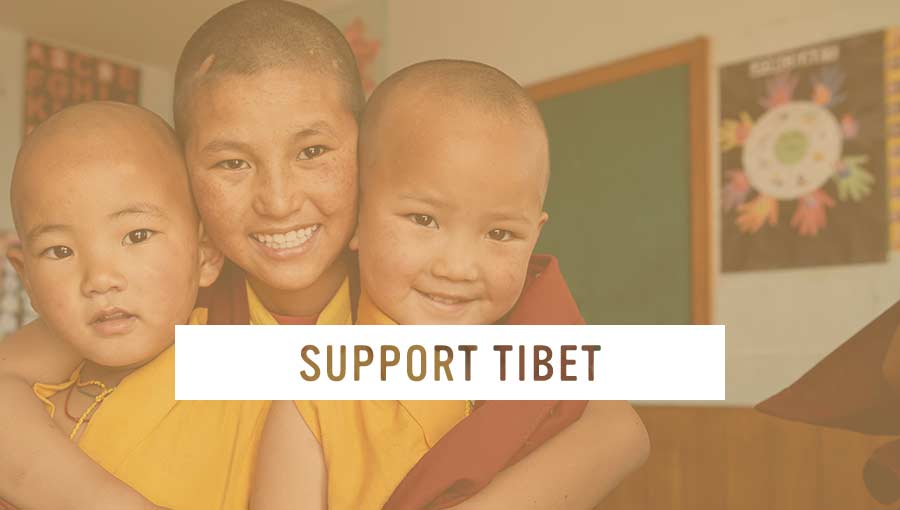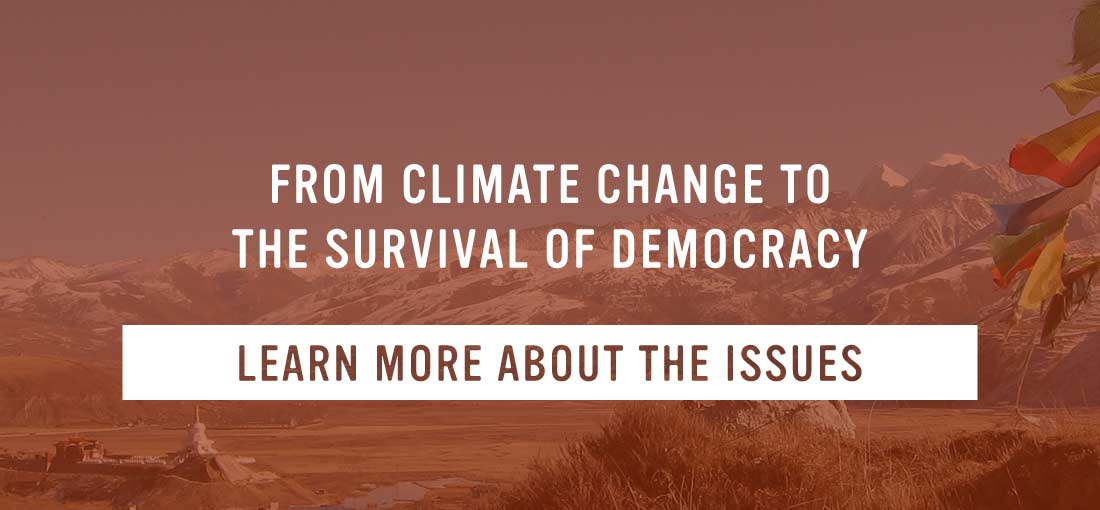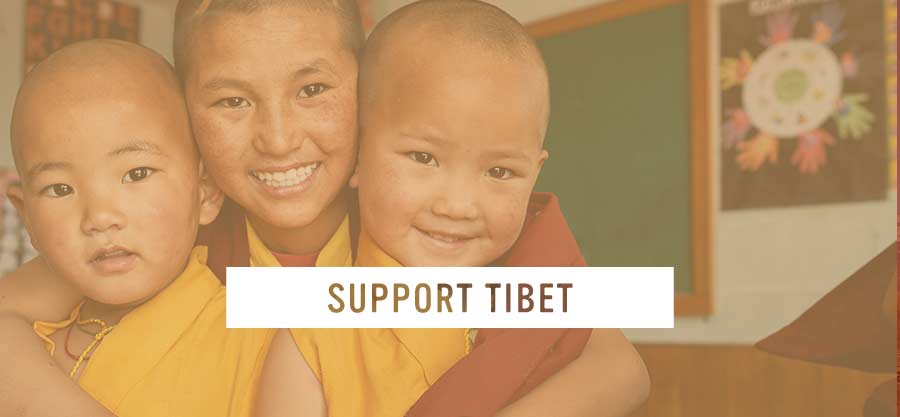FAST FACTS
Located in one of the most remote regions of the world, Tibet often seems mysterious to outsiders.
Below are some fast facts to help you learn more about this unique, important place.

SIZE
1 million square miles (10th largest country in the world)
CAPITAL
Lhasa
POPULATION
6 million Tibetans and an unknown number of Chinese
RELIGION
Tibetan Buddhism is practiced by 99 percent of the Tibetan population; Bon, the traditional religion, along with Islam and Christianity, are practiced by some Tibetans
LANGUAGE
Tibetan (of the Tibeto-Burmese language family); since China’s occupation, the official language has been Chinese
STAPLE FOOD
Tsampa (roasted barley flour)
NATIONAL DRINK
Salted butter tea
COMMON ANIMALS
Yak, Dzo, Dzomo (mixed breed), bharal (blue sheep), musk deer, Tibetan antelope, Tibetan gazelle, kiang (wild ass) and pika
COMMON BIRDS
Black-necked crane, lammergeyer (bearded vulture), great crested grebe, bar-headed goose, ruddy shelduck and ibisbill
MAJOR ENVIRONMENTAL PROBLEMS
Receding glaciers, mining, damming of rivers, deforestation, desertification and poaching of large mammals
AVERAGE ALTITUDE
14,000 ft.
TALLEST MOUNTAIN
Chomo Langma (Mt. Everest), 29,028 ft.
AVERAGE TEMPERATURE
24 degrees Fahrenheit in January; 58 degrees Fahrenheit in July
MINERAL DEPOSITS
Borax, uranium, iron, chromite, lithium, and gold
MAJOR RIVERS
Yarlung Tsangpo (Brahmaputra), Dza Chu, (Mekong), Drichu (Yangtze), Gyalmo Ngulchu (Salween), Ma Chu (Yellow), Senge Tsangpo (Indus) and Mapcha Khabab (Karnali)
ECONOMY
Primarily agriculture and animal husbandry for Tibetans; primarily government, commerce and the service sector for Chinese
PROVINCES
U-Tsang (Central Tibet), Amdo (Northeast Tibet) and Kham (Southeast Tibet)
BORDERING COUNTRIES
India, Nepal, Bhutan, Burma and China
NATIONAL FLAG
Snow lions with red and blue rays; the flag is outlawed inside Tibet
RELIGIOUS LEADER
The 14th Dalai Lama, who lives in exile in Dharamsala, India
POLITICAL LEADER
Sikyong (president) of the Central Tibetan Administration, currently Dr. Lobsang Sangay, who’s also based in Dharamsala
GOVERNMENT
In Tibet, communist since China’s occupation began; in exile, democratic under the Central Tibetan Administration
RELATIONSHIP WITH THE PEOPLE’S REPUBLIC OF CHINA
Colonial
LEGAL STATUS
Occupied
Located in one of the most remote regions of the world, Tibet often seems mysterious to outsiders.
Below are some fast facts to help you learn more about this unique, important place.
SIZE
1 million square miles (10th largest country in the world)
CAPITAL
Lhasa
POPULATION
6 million Tibetans and an unknown number of Chinese
RELIGION
Tibetan Buddhism is practiced by 99 percent of the Tibetan population; Bon, the traditional religion, along with Islam and Christianity, are practiced by some Tibetans
LANGUAGE
Tibetan (of the Tibeto-Burmese language family); since China’s occupation, the official language has been Chinese
STAPLE FOOD
Tsampa (roasted barley flour)
NATIONAL DRINK
Salted butter tea
COMMON ANIMALS
Yak, Dzo, Dzomo (mixed breed), bharal (blue sheep), musk deer, Tibetan antelope, Tibetan gazelle, kiang (wild ass) and pika
COMMON BIRDS
Black-necked crane, lammergeyer (bearded vulture), great crested grebe, bar-headed goose, ruddy shelduck and ibisbill
MAJOR ENVIRONMENTAL PROBLEMS
Receding glaciers, mining, damming of rivers, deforestation, desertification and poaching of large mammals
AVERAGE ALTITUDE
14,000 ft.
TALLEST MOUNTAIN
Chomo Langma (Mt. Everest), 29,028 ft.
AVERAGE TEMPERATURE
24 degrees Fahrenheit in January; 58 degrees Fahrenheit in July
MINERAL DEPOSITS
Borax, uranium, iron, chromite, lithium, and gold
MAJOR RIVERS
Yarlung Tsangpo (Brahmaputra), Dza Chu, (Mekong), Drichu (Yangtze), Gyalmo Ngulchu (Salween), Ma Chu (Yellow), Senge Tsangpo (Indus) and Mapcha Khabab (Karnali)
ECONOMY
Primarily agriculture and animal husbandry for Tibetans; primarily government, commerce and the service sector for Chinese
PROVINCES
U-Tsang (Central Tibet), Amdo (Northeast Tibet) and Kham (Southeast Tibet)
BORDERING COUNTRIES
India, Nepal, Bhutan, Burma and China
NATIONAL FLAG
Snow lions with red and blue rays; the flag is outlawed inside Tibet
RELIGIOUS LEADER
The 14th Dalai Lama, who lives in exile in Dharamsala, India
POLITICAL LEADER
Sikyong (president) of the Central Tibetan Administration, currently Penpa Tsering, who’s also based in Dharamsala
GOVERNMENT
In Tibet, communist since China’s occupation began; in exile, democratic under the Central Tibetan Administration
RELATIONSHIP WITH THE PEOPLE’S REPUBLIC OF CHINA
Colonial
LEGAL STATUS
Occupied











